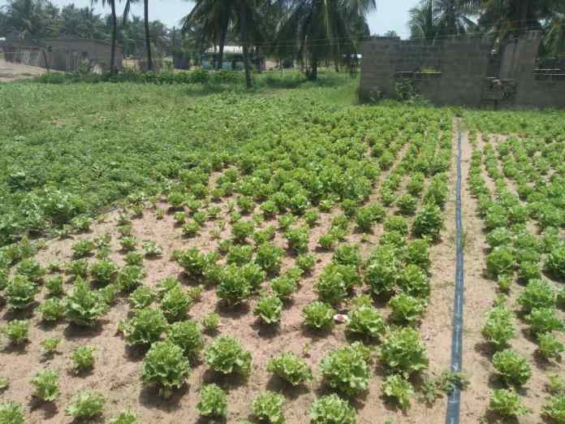Engineers at the Kwame Nkrumah University of Science and Technology (KNUST) are warning against consumption of vegetables grown along the Bibini River in Kumasi.
This is due to the detection of unsafe levels of heavy metals such as lead and cadmium and harmful bacteria.
The Bibini river is found within KNUST and is a tributary of Wiwi river.
It serves as a source of irrigation water for vegetables especially lettuce grown around the area.
Restaurants and food vendors in Kumasi and Accra purchase vegetables from farms along the Bibini river.
However, the river receives waste materials from a drain that has its content coming from a petroleum filling station, a car washing bay, gymnasium, hair salons, and greywater drains from adjoining hostels as well as drains from some KNUST engineering laboratories.
These activities result in the introduction of heavy metals and bacteria.
With time, these waste materials accumulate in agricultural soils and into food crops thus causing health problems.
The study therefore sought to find out the quality of the Bibini river used for irrigation and its impact on vegetable quality cultivated along the river.
The study published in the Journal of Environment & Ecosystem Science (EES) found the water from the river to be of low quality.
“The water quality indicators; dissolved oxygen, biochemical oxygen demand and water temperature were not within the recommended standards of Ghana’s Environmental Protection Agency,” lead investigator, Dr. Bennetta Koomson of the Department of Materials Engineering explained.
The research team also found that heavy metals including Cadmium, Lead and Chromium were present in the water, soil and vegetables.
Cadmium and lead found in vegetables were above the permissible limits.
Harmful bacteria were also found in the irrigation water as well as the lettuce.
“This makes them unsafe for human consumption as they can have adverse health implications on consumers.
“Microbial populations of faecal coliforms were found in the irrigation water as well as on vegetables produced beyond required levels indicating the vegetables produced are contaminated and of low quality hence can affect human life when consumed,” she said.
The team wants farmers to relocate to other areas to avert any future unfortunate events. “Farmers must be extensively educated and encouraged to relocate to other suitable farming land,” she advised.
Latest Stories
-
Political parties should plan for losses, not just wins – IGP advises
54 seconds -
524 Diasporan Africans granted Ghanaian citizenship in ceremony
2 mins -
Mahama urges Afram Plains North residents to avoid ‘skirt and blouse’ voting
4 mins -
Asantehene receives more 19th century gold ornament and regalia
11 mins -
Hohoe Ghana Blind Union organises training for members ahead of Election 2024
18 mins -
Alan Kyerematen reveals his future plans for Ghanaian Health professionals
19 mins -
AAIN empowers women and small enterprises in Upper East Region through SHINE project
20 mins -
Akufo-Addo leads nationwide commissioning of 80 educational projects
26 mins -
Ghana and Seychelles strengthen bilateral ties with focus on key sectors
57 mins -
National Elections Security Taskforce meets political party heads ahead of December elections
1 hour -
Samsung’s AI-powered innovations honored by Consumer Technology Association
1 hour -
Fugitive Zambian MP arrested in Zimbabwe – minister
2 hours -
Town council in Canada at standstill over refusal to take King’s oath
2 hours -
Trump picks Pam Bondi as attorney general after Matt Gaetz withdraws
2 hours -
Providing quality seeds to farmers is first step towards achieving food security in Ghana
2 hours

